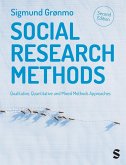Questions about change in social and personal life are a feature of many accounts of the contemporary world. While theories of social change abound, discussions about how to research it are much less common. This book provides a timely guide to qualitative methodologies that investigate processes of personal, generational and historical change.
The authors showcase a range of methods that explore temporality and the dynamic relations between past, present and future. Through case studies, they review six methodological traditions: memory-work, oral/life history, qualitative longitudinal research, ethnography, intergenerational and follow-up studies. It illustrates how these research approaches are translated into research projects and considers the practical as well as the theoretical and ethical challenges they pose. Research methods are also the product of times and places, and this book keeps to the fore the cultural and historical context in which these methods developed, the theoretical traditions on which they draw, and the empirical questions they address.
Researching Social Change is an invaluable resource for researchers and graduate students across the social sciences who are interested in understanding and researching social change.
The authors showcase a range of methods that explore temporality and the dynamic relations between past, present and future. Through case studies, they review six methodological traditions: memory-work, oral/life history, qualitative longitudinal research, ethnography, intergenerational and follow-up studies. It illustrates how these research approaches are translated into research projects and considers the practical as well as the theoretical and ethical challenges they pose. Research methods are also the product of times and places, and this book keeps to the fore the cultural and historical context in which these methods developed, the theoretical traditions on which they draw, and the empirical questions they address.
Researching Social Change is an invaluable resource for researchers and graduate students across the social sciences who are interested in understanding and researching social change.
This book will undobutedly be a key reference work in the fast growing area of qualitative analyses of social change -
International Journal of Social Research Methodology
This is a scholarly and thoughtful book. It is clearly written and accessible with useful summaries of the main points at each chapter end...It provides a valuable resource for qualitative social researchers and students, being packed with references and further resources across a range of research traditions
Social Research Association News
The book has broad appeal to anyone interested in researching social change, at whatever stage they are at in their career. It provides not only a useful introduction to a range of methods but also helps the researcher to consider their positioning within their own project. The authors write enthusiastically about research and celebrate the fact that it should be a
collaborative process, two important concepts for any qualitative researcher to remember
Qualitative Research
International Journal of Social Research Methodology
This is a scholarly and thoughtful book. It is clearly written and accessible with useful summaries of the main points at each chapter end...It provides a valuable resource for qualitative social researchers and students, being packed with references and further resources across a range of research traditions
Social Research Association News
The book has broad appeal to anyone interested in researching social change, at whatever stage they are at in their career. It provides not only a useful introduction to a range of methods but also helps the researcher to consider their positioning within their own project. The authors write enthusiastically about research and celebrate the fact that it should be a
collaborative process, two important concepts for any qualitative researcher to remember
Qualitative Research








